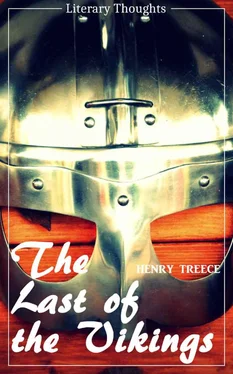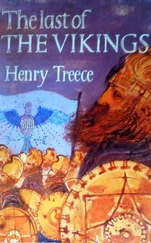King Harald's face became hard at this. His hands were clasped together and when he heard Ljot's words, he clenched his fingers so tightly together that the knuckles cracked. He said, 'After such boasting, you had better hoist my banner well, friend Ljot. I am not short of Orkneymen, remember, but there is only one Landwaster.'
Many men, sitting in that ring, wished that Ljot had not been so outspoken and that Harald had not answered him so hotly. Before a battle, it ill becomes any man, king or carle, to speak such words as may be heard elsewhere and remembered, if the luck falls on the other side of the fence.
And now the luck seemed to fall strangely, for as Ljot grasped the tall ash-pole, a sudden gust of wind came from nowhere and wrenched at the heavy silken cloth, bellying it out like a sail so that no three men could have held it, much less driven the iron point into the ground.
Landwaster crashed back to the turf, its long folds whirling about Ljot and dragging him down with it. And though he looked a foolish enough figure on the ground, with his legs kicking out, no one in the ring laughed, or even whispered. The silence that lay upon them all was much heavier than lead. Even the wind stopped blowing.
As for King Harald, his eyes and face had become stone, or iron, or ice. He only said, 'You shall have your chance, before this day is out, to prove that you mean well by me.' But these words, though simple ones, were said in such a way that no man who was there did not feel the hairs rise upon his head and neck, as stiff as wire.
Then, all at once, a man in Earl Tostig's company pointed towards the west and shouted, 'Look! Look! The English king is coming to bring us his crown in person!'
All men gazed at the cloud of dust which rose on the road beyond the meadow. King Harald, who was sharper-eyed than other men, said, 'His force outnumbers ours, and will be here before we can put on our armour and make ready for them.'
Then he called across to Earl Tostig, 'Is that small man on the black horse at the front your brother, then? The one with the golden helmet?'
Earl Tostig answered sharply, 'My brother is the one on the black horse, but I have yet to hear anyone call him small to his face.'
The King of Norway smiled gently and said, 'You shall have that pleasure before long, Tostig Godwinson.'
Then he stood up among his Northmen and forgot all else except the battle that was coming. In a loud voice, he commanded his host to cross the single bridge that spanned the river Derwent and to take up their positions on the far side, forming a great shield-ring about Landwaster.
Ljot of Orkney began to move away with the others, but King Harald suddenly called him back. 'Your place is not in the far field, hoister of sails and banners,' he said grimly. 'I need you for a more special task.'
Ljot gazed back into the king's cold eyes. 'I am your dog, master,' he said without blinking.
For an instant, Harald Hardrada almost smiled at him: but then he recollected himself and said, 'Yes, you are my dog, and a good dog guards his master's door. I have no door in England at the moment, but I have a bridge; and that you shall guard with your axe, to see that this English king does not pass over the river until we are all armed and ready for him on the other side.'
Ljot slapped his axe-blade and nodded. 'I shall see that you have enough time, Harald,' he said calmly. 'For your part, see that old man Fridrek makes a better job of hoisting Landwaster than I did!'
King Harald said, 'He will, fellow. He has not sailed to Iceland twenty times, but he has stood in twenty battles, which amounts to much the same thing. Now, good luck sit on your axe-edge. And, wherever you are going, I wish you a good journey.'
Ljot called at the king's back, 'I shall travel merrily, Harald, which is more than will be said for the Englishmen who set foot on the bridge.'
Then, as the Northmen crossed over, Ljot dragged on his mail shirt and stood waiting, leaning on the bridge and whistling, and occasionally swinging his long axe like a scytheman cutting corn, delighting in the hiss the keen blade made, going through the air.
In his shield-ring, on the far meadow, with great Landwaster flapping behind him, King Harald of Norway buckled on his own mail shirt. It was very long and reached down to the lower leg. When the king wore it, the Norse carles called him 'Emma' behind his back, because the skirts were so long. In his own sharp way, Harald had got to know of this and now called his ring-shirt by the same name, gritting his teeth gently and sweeping his pale eyes over the carles' faces like a light whip-lash.
'On, Emma, on!' he grunted that hot day. 'Let us have no woman's treachery about you. Keep the arrows out, that is all I ask.'
As he spoke, two strange things happened. First, an angry cry went up from the tight-packed Norse carles in the foremost ranks. 'Ljot is down!' one said. 'Now the English are coming over the bridge.'
Harald was busy with a throat-buckle and, not looking up, asked, 'How did he fare?'
A burnt-faced Icelander called back above his shield, 'He took the heads off three before one went under the planks and poked a spear up into him, the English dogs!'
Harald finished fastening the buckle, then nodded and said, 'When I am their king, I shall have a word or two to say to the captain who ordered such a death, and he will have but short time to answer me.'
As he spoke, he knew that he should not have tempted his fates so, for suddenly a tearing gust of wind came from nowhere and almost flung Landwaster down again on the hillock. Fridrek held on to the great ash-pole as though he was wrestling with a troll in the darkness; but it was all he could do to keep the banner upright. And while he struggled, a raven came down over the King of Norway and cried out so furiously in its cracked voice, like a scolding old crone, that all the carles were silent with foreboding. Harald pretended to pick up a stone from the ground and made the action of throwing it. The bird flapped away on its ragged black wings.
The King of Norway laughed and said, 'See, that messenger talks much—but knows nothing!'
Then the second strange thing happened.
There was a marshal in the King's Host, named Styrkar, a tall and gallant man, ever first in the blow-swapping, who carried scars from Sicily and Jerusalem across his face. In all their time together, the king asked Styrkar's advice on battle-affairs more than he did of any other man, for this marshal knew more about war than any five living kings, having spent half his days on battlefields. Styrkar's mother came from Gritriver, near Hlidarend, in Iceland, and claimed to be a kinswoman of Gunnar Hamundarson, which made the marshal of heroic blood. His father was Gizur of Bergen who took a longship to Dublin before his sixteenth birthday and brought it back safely through winter storms, down to the gunwales in water, being so laden with Irish gold that the oarsmen could not even sit down to row, much less lie down to sleep.
So this Styrkar was of the finest birth on both sides, and any king might be glad to ask his counsel. Just now, he was setting the shield-ring, with spearmen in the first ranks to keep the English horses off; then shield-men with their bucklers rim to rim; and, nearest the king and banner, bowmen who could send their arrow-hail over the heads of all in front.
King Harald Hardrada called out to Styrkar the Marshal, 'From where you are, friend, how does it look? Shall we have these English on their backs and knees in time for dinner, do you think?'
In the bright sunlight, Styrkar glanced up at the king with a wet red face, and his lips moved in answer. But the King of Norway stood aghast to hear his words, for his voice had changed so much. In the shuffling and clattering of battle-dawn, it was not Styrkar's high voice that seemed to speak, but the deep voice of Harald's brother, King Olaf. Yet Olaf the Saint had been dead for thirty-six years.
Читать дальше












